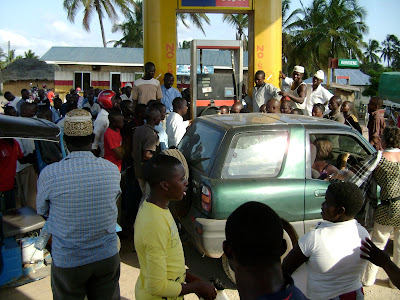But first we had to get there and as usual, the journey would not be complete without hijinx! And hilarity! In this case, we flew to Mtwara, a lovely community on the southern coast of Tanzania where women and babies die at alarming rates. We came down here to find out why and we met a Liverpudlian pediatrician named Jim Pauling who talked about neo-natal risk factors and mothers-to-be who ignored warning signs or else had no money or transportation to hospital or who for other reasons, just waited too long to come to hospital and died as a result. And all those babies who died in the womb or got born and then just died, overnight, before the mothers could take them home.
We'll get to that. First, a nice Swiss lady named Cristiana who spoke more languages than I could count and who volunteered with an awesome NGO named Interteam picked me up at the airport and offered to drive us the two hours to Ndanda, our first stop. She had to run some errands so she asked if we would mind if she dropped us at THE BEACH for a few hours. Hello!? We frollicked in the baking heat with the sea sponges and hermit crabs and starfish until it was time to go.
Cue the hijinx. Tanzania—you frisky soul! Never a dull moment! We go to three gas stations to fill up for the journey. No gas. We get to the fourth and final one and sure enough, petrol. And also 75 piki-pikis (motorcycles) a half dozen dala-dalas (buses), some three-wheeled bjajs, several trucks and more than a dozen cars, all waiting patiently, and some not so patiently, in line. Some of the bikers had been waiting since morning and it was already 3 p.m. They were getting angry. Drivers stood around the pumps in mobs, shouting and gesturing, some of them kinking the hose when they thought the person had taken enough, worried the supply would run out before their turn. It was like a scene from Mad Max. This is what's coming people of the world. A glimpse of our future when we run out of oil.
 |
| Wish I had my bicycle |
After two hours, we got our gas and departed, hoping to make it to Ndando and the Abbey at St. Benedict's before dark fell on the windy, bumpy, dangerous arteries that comprise Tanzania's highway system.
Not only did we make it there, we made it in time for supper! Gotta love those Benedictine Brothers and Sisters! Ndanda was great: 40-foot mango trees and three-inch long praying mantises and five-inch-long geckos and spring water that runs into the Abbey so that you can actually turn on a tap and drink the water without boiling it. Heaven.
Then we went to Nyangao where the aforementioned Dr. Jim has been volunteering with VSO with his pharmacist volunteer wife Pam, an unbelievably dedicated young couple saving lives every day. For those who know me, you know how my twins had to stay in hospital for a few months after they were born 7 years ago because they were premature. We saw what passes for neo-natal care at St. Walburg's: four tiny babies in tattered, open air incubators sitting under heat lamps like so much meatloaf being kept warm in a restaurant kitchen. None of the lamps have consistent heat so Jim is constantly moving the cribs a little this way, a little that, so they don't get too hot, or too cool. It boggles the mind. A pair of twins had been born at 1.5 pounds a few days ago, one survived the first night and the other did not. The mother was sanguine, happy to have one baby at least. Jim has developed a newborn checklist that nurses must now consult when a baby is born to determine whether the baby should be admitted or sent home with mom. Admissions have tripled. Last year, 1400 babies were born at St. Walburg's and 75 were admitted. This year, more than 200 will be admitted. And most of them are living.
 |
| Bodacious Baobab Tree, Dar es Salaam |
Sure it's tough living with lots of ants and no internet, with lots of heat and no gasoline, but frustration is OK. It's good to be delayed and distracted and thwarted or else how would you appreciate every last damn thing you've got?

So sorry missed you before your departure, and so sorry you wont be here for Jim and Pams sendoff! Jamani! But enough of the sorrys ... so great to meet both you and Scott. Karibu tena, tutaonana badaaye!
ReplyDelete